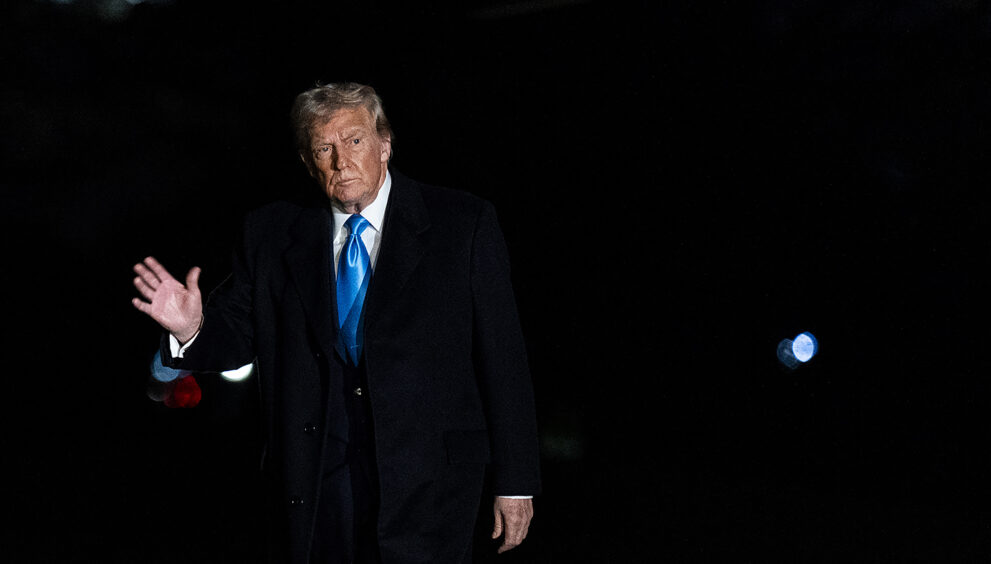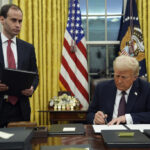The Fallacy of Trump’s Tariffs and Their Connection to Far-Right Culture Wars

President Trump’s proposed 25 percent tariffs on Canada and Mexico, now postponed for a month, have been criticized as illogical, nonsensical, perplexing, purposeless, and “a completely unnecessary solution for a non-existing issue.”
The tariffs can be deemed nonsensical from both trade and economic nationalism standpoints. Nonetheless, they hold merit in a menacing cultural context, as highlighted in Trump’s second inaugural speech, commonly referred to as his “I Have a Nightmare” speech, where he enumerated America’s numerous trade and cultural adversaries.
Historically, proponents of mercantilist ideologies like Alexander Hamilton and Friedrich List used economic arguments to justify protectionism for nurturing “infant industries.” However, such justifications are now considered irrelevant. Tariffs would negatively impact well-established and highly competitive American sectors, spanning from agriculture to automobiles to artificial intelligence.
Another argument in favor of tariffs emerges in times of significant economic distress, when groups struggling due to global exposure call for protection. For instance, high tariffs were enforced in Germany following the Panic of 1873, and the Smoot Hawley tariffs in the U.S. were implemented in 1930, marking the onset of the Great Depression. But the current U.S. economic situation doesn’t mirror such a catastrophic crash.
Additionally, there’s the claim of deteriorating terms of trade with Canada and Mexico. However, this notion is merely economic jargon. In thriving economies, trade deficits as a result of importing inexpensive goods allow for domestic resources to be allocated toward innovative and efficient industries and agriculture, analogous to how purchasing affordable groceries and items frees up funds for education or investing in a small business. This is one reason why figures such as Sen. Rand Paul (R-Ky.) have condemned Trump’s tariffs as additional taxes on U.S. citizens.
Nonetheless, countries like China that exploit international trade regulations should be challenged, a stance on which Trump has garnered bipartisan support.
In the pre-World War II era, Germany epitomized economic nationalism, beginning with Imperial Chancellor Otto von Bismarck. Bismarck utilized tariffs strategically, leading to the unification of the German state in 1871. However, these tariffs mainly benefitted powerful aristocrats and less efficient German industries, neglecting the interests of competitive industries. The tariffs played a pivotal role in the militarized unification of Germany.
The example of Bismarck’s enduring influence underscores the cultural grounds for Trump’s tariffs and corresponding cultural nationalism, lacking a logical economic rationale.
The correlation between Trump’s tariff agenda and his crackdown on “illegal immigrants” and fentanyl trafficking is evident. Although explicitly referring to Canada and Mexico, his tariffs may serve as a parallel tactic.
The militaristic aspect accompanying economic nationalism in Germany and Trump’s punitive tariffs is salient. Trump’s tariff threats were accompanied by suggestions of incorporating Canada as the 51st U.S. state, and he tactically approached Panama and Denmark based on U.S. economic interests. Moreover, he appointed an extreme far-right advocate with religious symbols tattooed on his chest as the defense secretary. Trump’s actions, such as pardoning the far-right extremists involved in the January 6, 2021 incidents, have caused trepidation worldwide.
Project 2025, believed to be the foundation of Trump’s executive directives per the Heritage Foundation, focuses on tariffs for revitalizing the American manufacturing and defense industries.
In exchange for the tariff delay, Canada and Mexico agreed to deploy 10,000 troops each to curb fentanyl trafficking, a move met with skepticism given Canada’s situation and complexity in Mexico’s case. Canada’s financial contribution towards anti-fentanyl endeavors was highlighted, while Mexico emphasized the influx of firearms smuggled from America by drug cartels. Trump’s tactics are raising concerns on a global scale.
Considering the cultural justifications for Trump’s tariffs, it’s clear that a conservative economic rationale is essential to garner support beyond MAGA populists. Otherwise, these tariffs might continue to symbolize a cultural dilemma. Nationalist cultural dilemmas historically lead to significant conflicts and wars.
To prevent such dire consequences, the economic might and resilience of American industries and agriculture, or the economic realities of market fluctuation, should be emphasized. Monday’s stock market instability serves as a caution from the practical financial world.
J.P. Singh is a Distinguished University Professor at George Mason University and a Richard von Weizsäcker Fellow at the Robert Bosch Academy (Berlin). He also serves as the co-editor-in-chief of Global Perspectives.






















































































































































































































































































































































































































































































































































































































































































































































































































































































































































































































































































































































































































































































































































































































































































































































































































































































































































































































































































































































































































































































































































































































































































































































































































































































































































































































































































































































